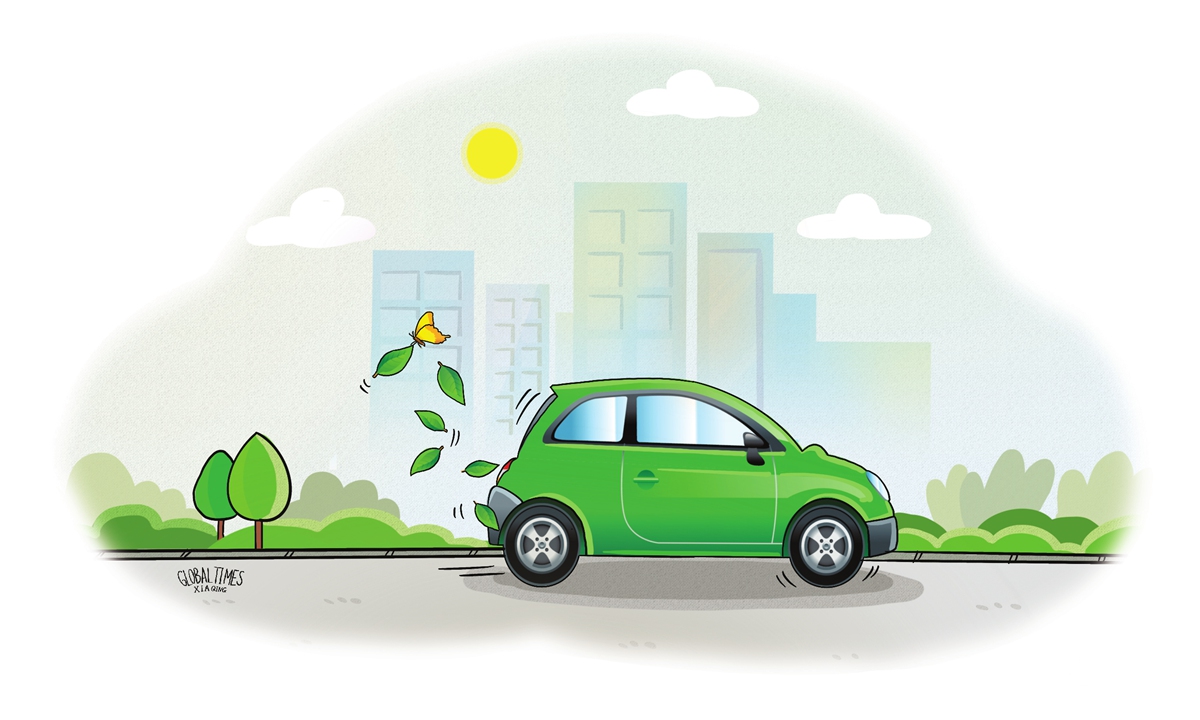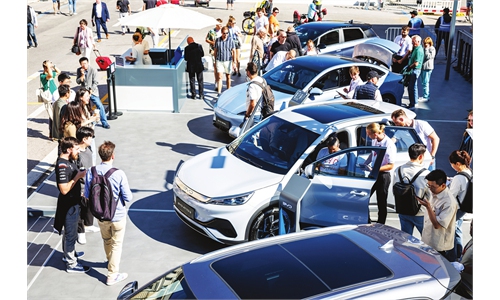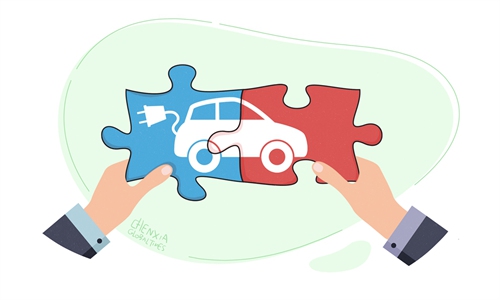China benefits from strategic vision, first-mover advantage in global EV competition

Illustration: Xia Qing/Global Times
The world's automotive industry is facing the most significant transformation in its history, as the replacement of the traditional internal combustion engines with more sustainable, energy-saving and environmentally friendly electric batteries are rapidly gaining pace. Whoever sets up a solid foundation in electric-vehicle (EV) manufacturing technology and supply chain will set the pace for the next stage in an important frontier of economic competition.China is benefiting from the government's strategic vision and Chinese entrepreneurs' first-mover advantage gained through investing early and heavily in battery technology research, upstream minerals mining and refining, and broad advances in mobile digitalization and in-vehicle software development. All this enables China to lead the global rush and jostle for EVs, as major countries have all ratcheted up efforts to fight carbon dioxide-induced climate change.
China now holds a dominant position in the electric-vehicle supply chain, with more than 400,000 EV-related enterprises scattered throughout the nation. The battery is by all metrics the most crucial component of an EV and accounts for 40 percent of the vehicle's sale price. Also, the country houses more than half of the world's processing and refining capability for lithium, cobalt and graphite - all essential materials for making batteries.
The global EV market scale is projected to grow more than threefold to reach $1.6 trillion by 2030, from an estimated $500 billion this year, growing at a compound annual rate of 18 percent through the current decade, according to industry studies. Chinese EV makers are estimated to take up about 50 percent of the global EV market by 2030, which is set to give a great boost to China's manufacturing prowess.
Just 15 years ago, China was still a "laggard in auto-making." In 2010, China's overseas vehicle sales "mostly involve low-tech trucks and buses," almost all shipped to other less-developed markets such as Africa, Eastern Europe and Central and South America where "the buyers are easy to please," a Western automotive industry media reported then. "Despite the hype and hoopla, hard evidence indicates homemade Chinese cars are not yet ready for major league export markets."
Now, a sea change has occurred in the global auto landscape. China surpassed Japan to become the world's largest auto vehicles exporter in the first six months of 2023, which analysts attribute to the growing popularity among environmentally conscious millennial and Generation Z youngsters worldwide to embrace zero-emission green EVs.
China is already the biggest auto market in the world and a leading production and innovation hub for auto components and vehicles, and Chinese vehicle manufacturing has reached a "formidable maturity level," another Western media outlet noted recently.
Thanks to China's comprehensive supply chain advantages, low costs in logistics, labor and land use, the country's EV manufacturers own a considerable cost advantage compared with the US and European carmakers. China's exports of new-energy vehicles exceeded 534,000 units from January to June, up 160 percent year-on-year, according to data from China Association of Automobile Manufacturers.
The global automotive sector is transforming from a traditional manufacturing-assembly industry to a technology-intensive industry. Electrification, connectivity, autonomous driving and ride sharing are the four major evolution trends for the future auto sector, and in each of the four categories, Chinese automakers have become the front-runners in innovation as well as production. For example, Chinese enterprises' dominance in producing advanced batteries - led by CATL, BYD and EVE Power - means the country will most likely account for two thirds of global battery production by 2030.
Europe and Japan are expected to suffer the biggest loss of global market share in this transformation from gasoline-fired vehicles to new-energy cars, because their automakers had been focusing on innovations of traditional auto technologies such as how to shore up their market edge in producing more efficient diesel and gasoline vehicles, while Chinese car-makers have, since 2010, directed increased investment into R&D for battery breakthroughs, and how to improve internet-connected driving experiences, including in-vehicle infotainment systems.
Regarding China's home and the overseas markets, BYD, GAC Aion, Li Auto, NIO, Chang'an and SAIC Wuling, together with Tesla, are the leading EV sellers. In 2022, BYD's global sales have surpassed Tesla to become the world's biggest EV manufacturer. BYD takes advantage of in-house manufacturing depth, allowing for integrated solutions, including battery cell-to-body design and integrated power-electronics modules, as well as the low-cost Chinese supply chain. GAC Aion and Li Auto are catching up rapidly.
In May this year, a research report by the International Council on Clean Transportation (ICCT) looked at the progress in the industry transition from gasoline to electric cars, which listed BYD and Tesla as the "leaders" in the pack. The six "laggards," according to ICCT, were comprised of one Indian automaker and five Japanese car brands - including Toyota, Nissan and Honda.
The reason why Japanese automakers have performed so badly in the EV transition is largely due to Toyota and other major Japanese brands' obsession over developing hydrogen drive cars, which has proved to be a categorically misguided move. With the global consumers rapidly switching to electric cars, the reluctance of Japanese automakers to recognize the limitations of hydrogen-powered vehicles could fare badly on Japan's auto industry and reduce the country's future competitiveness.
While many German auto brands are touting planned electric-vehicle lineups, they remain a long way from catching up with BYD, Tesla and other leading Chinese EV makers. BYD delivered 1.25 million EVs and Tesla delivered 900,000 in the first half this year, but Mercedes-Benz, BMW, Porsche and Volkswagen's combined output failed to reach these numbers. However, German car giants are deemed many years ahead of their Japanese counterparts in embracing EV technology, and Germany will, most likely, be a serious contender in the green vehicle market.
The author is an editor with the Global Times. bizopinion@globaltimes.com.cn



